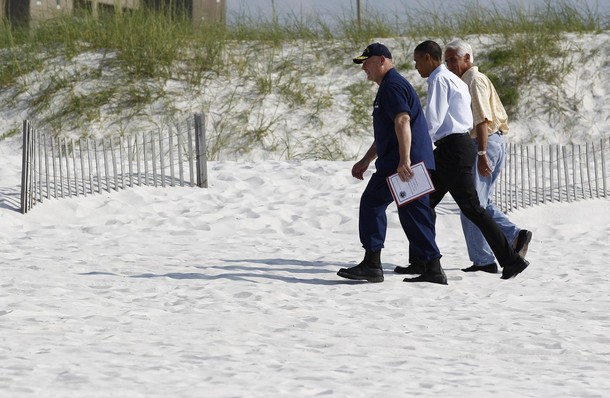
Last Friday, I wrote about harsh comments flying across the Atlantic from the United States in the wake of the BP oil spill. Many in the U.K. have taken American frustrations at BP as insulting to the British people and nation. If anything, this has picked up steam.
Emotions in the British press have ranged from outrage, to caution, to understanding of the situation the U.S. and its political leaders find themselves in.
Writing in The Daily Mail, columnist Geoffrey Wheatcroft characterized President Barack Obama’s “denunciations” of BP as having “damaged the interests not only of that company but of most British people, in a way that must make us wonder whether he leads a friendly country.” Wheatcroft goes on to say that Obama’s “rhetoric is repellently hypocritical as well as demagogic,” and claims the president has an “Anglophobic spite” deriving from his father beyond tortured by the British in Kenya (an unsubstantiated claim according to Wheatcroft). The polemic concludes by suggesting the U.K. reevaluate its “ignoble” relationship with Washington, and even considers recalling British troops from Afghanistan, which he terms “a hopeless American war.”
Wheatcroft certain seems to be going for hyperbole in his article. However harsh or offensive Obama’s language might have been, it cannot be accurately stated as demagogic, and Wheatcroft provides no evidence of how it has been hypocritical. Plus any bad blood that might be brewing as a result of the oil spill cannot be considered sufficient cause for the U.K. taking such drastic measures as removing troops from Afghanistan, and is certainly far from sufficient cause for even discussing dissolving the longstanding ties with the U.S. altogether.
It is true that Obama brings a different perspective on transatlantic relations to the White House. As British journalist Mary Ellen Synon intones in her blog, Obama is the first U.S. president raised without ardent cultural or emotional ties to Britain or Europe.
But to say as Synon does that the Obama administration “is ready to dump the Old World in pursuit of the One World,” and that the U.S.-U.K. special relationship, “whatever is left of it, is over” is a gross overstatement. The two countries still see eye to eye on many issues and share many common goals, especially in the security arena. One disagreement regarding a single multinational company—though based in Britain BP has holdings worldwide—should not (and must not be allowed to) be enough to scuttle the entire partnership on all fronts.
Other British commentators have taken a more appropriate, tempered approach. Gideon Rachman, chief foreign affairs commentator for Financial Times, states “the evidence that actual members of the U.S. administration are indulging in Brit-bashing is actually pretty slight.” Additionally Obama’s recent references to BP as British Petroleum (language criticized by many in the U.K.) even though the company’s name changed to the initials in 1998 in and of itself is not evidence of “raging antipathy” towards Britain.
An overlooked explanation for Obama’s behavior, as Rachman points out, is that he is “genuinely angry – and that directing public ire towards BP is politically expedient.” Rachman also reaffirms that Prime Minister David Cameron would not actually consider pulling British troops from Afghanistan in reaction to the BP crisis, and points out—correctly in my opinion—that under the surface of the U.S.-U.K. special relationship lies troubling antagonisms which could impact present security situations worldwide if the relationship breaks down.
Michael Tomasky’s blog for The Guardian notes that Obama’s “attacks” have been received as applying not only to BP, but to the country and crown as well. But as Tomasky, an American, poignantly puts it, “I have a hard time imaging that out in Oshkosh, Wisconsin a husband and wife are sitting at their breakfast table, watching CNN and deciding to toss their English muffins in the garbage.”
The most accurate characterization of Obama’s statements and behavior, and those of American political and community leaders in general, likely align with Tomasky’s observation that while Obama may have mixed feelings about Britain, “he surely doesn’t hate it. And there is no broad anti-British sentiment in the U.S. There is anti-BP sentiment. And well there ought to be.”
The U.S.-U.K. partnership has been around longer than Obama, or Cameron, or BP CEO Tony Hayward has been alive. It has survived two world wars, a cold war, and devastating terrorist attacks in both homelands, all events that ended up making the partnership stronger.
It is doubtful any of these current leaders—whose time in the spotlight will be brief compared with the countries’ long legacy of cooperation—will let recent events lead to the end of this cooperation. In terms of worldwide security, for which the U.S. and U.K. are two vital players, too much is at stake.
Click here to read an excerpt from Atlantic Council Board of Directors member Eric Edelman‘s article in The American Interest magazine entitiled "A Special Relationship in Jeopardy."
Scott Bleiweis is an intern with The Atlantic Council editorial office. He is currently pursuing a masters degree in International Studies with the Korbel School of International Studies at the University of Denver. Photo credit: Reuters Pictures
Image: obama%20crist%20allebn_0.jpg
